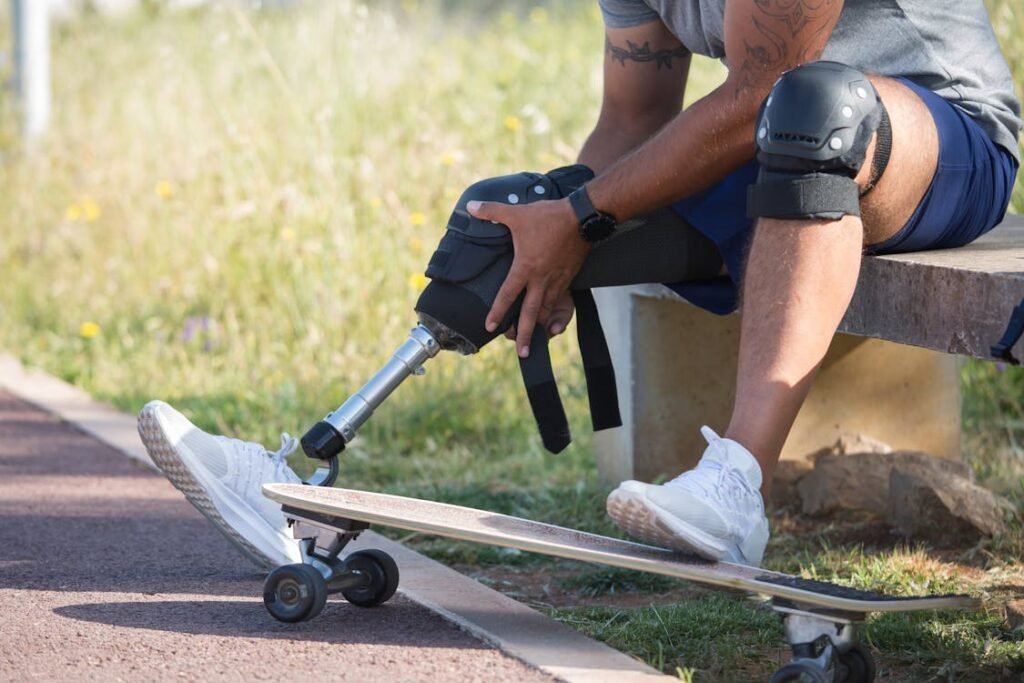Living with a disability can bring many challenges, including financial difficulties and the need for medical support. In India, the government provides disability pensions and prosthetic benefits to help individuals lead more independent and dignified lives. These programs aim to ease the financial burden of daily living expenses and assistive devices, including prosthetic limbs, for those who need them.
However, many people are unaware of how to apply for these benefits or struggle with the complex application process. Understanding who qualifies, what documents are required, and where to apply is crucial for securing financial assistance and access to high-quality prosthetics.
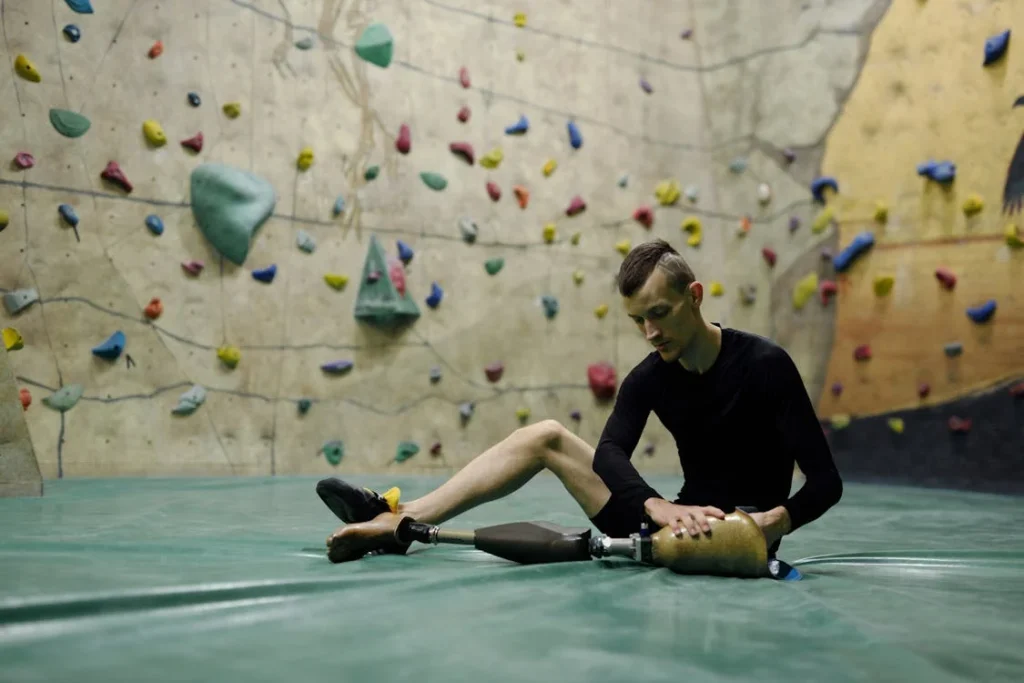
Understanding Disability Pension and Prosthetic Benefits in India
The Indian government offers financial aid and medical assistance to individuals with disabilities to improve their quality of life.
Disability pensions provide monthly financial support, while prosthetic benefits ensure access to affordable or free assistive devices like artificial limbs, mobility aids, and rehabilitation services.
These benefits are available through both central and state government schemes, and eligibility depends on disability percentage, income level, and employment status.
Who is Eligible for Disability Pension?
The disability pension is primarily meant for individuals who have permanent disabilities that impact their ability to work or earn a stable income. Eligibility criteria vary slightly by state, but the common requirements include:
- The applicant must have at least 40% disability, certified by a government hospital or medical board.
- The person must be below the poverty line (BPL) or have a low-income household, depending on the state’s income criteria.
- The individual should not be receiving any other government pension.
The disability pension is typically provided through the Indira Gandhi National Disability Pension Scheme (IGNDPS), which is part of the National Social Assistance Programme (NSAP).
Under this scheme, eligible individuals receive a monthly pension amount, which varies by state and disability severity. Many states also provide additional financial assistance on top of the central government pension.
Who Can Apply for Prosthetic Benefits?
People who have lost a limb due to accidents, congenital conditions, or medical amputations can apply for government-funded prosthetic benefits.
These benefits are often provided through rehabilitation programs and public health initiatives in collaboration with organizations like ALIMCO (Artificial Limbs Manufacturing Corporation of India) and state disability welfare departments.
Applicants must meet certain conditions to qualify for free or subsidized prosthetic devices. Generally, the requirements include:
- A disability certificate proving limb loss or impairment, issued by a government hospital.
- Proof of financial need, especially for those seeking free prosthetic limbs.
- Registration with the state’s disability welfare department or municipal health office.
For individuals who do not qualify for free prosthetic limbs, low-cost options and subsidized financing plans are available through government hospitals, NGOs, and prosthetic manufacturers like Robobionics.
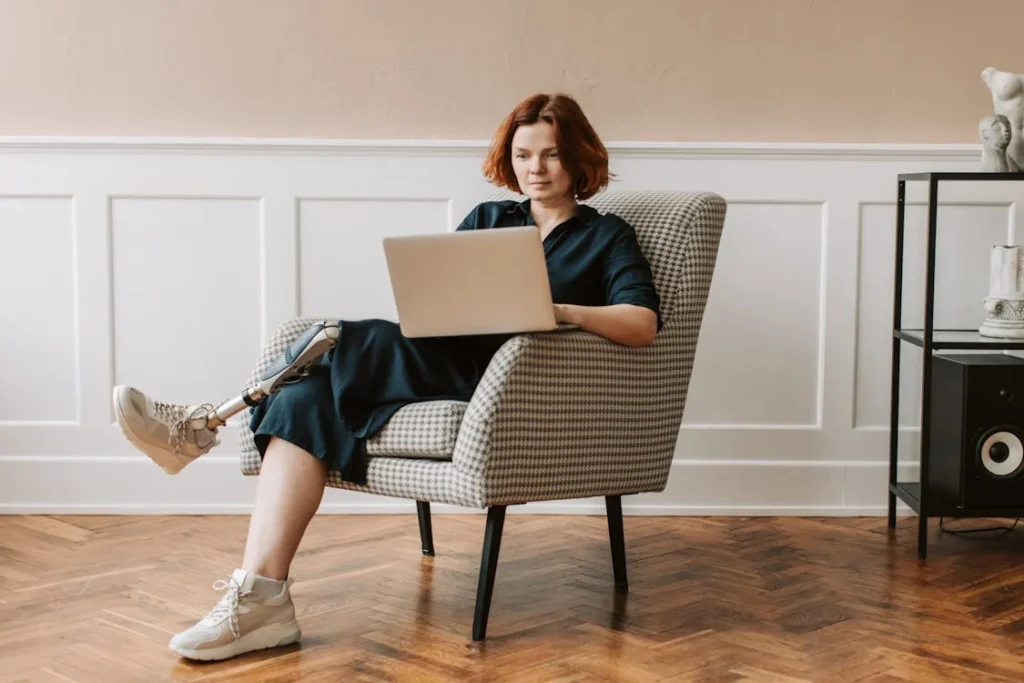
Step-by-Step Process for Applying for Disability Pension and Prosthetic Benefits
Understanding the application process for disability pension and prosthetic benefits can make it easier to receive the support you need.
While the exact steps may vary by state, the overall process remains similar across India. Below is a detailed guide on how to apply for both disability pension and prosthetic benefits, ensuring that eligible individuals receive timely financial aid and assistive devices.
Step 1: Obtain a Disability Certificate
The first and most crucial step is obtaining a disability certificate, which serves as proof of disability and is required for both pension and prosthetic benefits. This certificate is issued by a government hospital or a certified medical board based on the percentage of disability.
To get a disability certificate, you need to visit the nearest district hospital or medical college with your medical records. A medical board, consisting of government-appointed doctors, will evaluate your condition and determine the level of disability.
If the disability is 40% or more, you will receive a Unique Disability ID (UDID) card, which is now mandatory for availing government benefits. The UDID card can be applied for online through the Sugamya Bharat portal (www.swavlambancard.gov.in).
Step 2: Apply for Disability Pension
Once you have your disability certificate, the next step is applying for the Indira Gandhi National Disability Pension Scheme (IGNDPS) or any state-specific disability pension program.
The application can be submitted online through the National Social Assistance Programme (NSAP) website (https://nsap.nic.in) or at the local Municipal Office, Panchayat Office, or Social Welfare Department.
You will need the following documents:
- Disability certificate or UDID card
- Aadhaar card and proof of residence
- Bank account details for direct benefit transfer
- Income certificate (if applicable)
- Recent passport-size photographs
After submission, authorities will verify the documents and process the application. If approved, the monthly pension amount will be credited directly to the applicant’s bank account. Some states also conduct physical verification before approving pension disbursement.
Step 3: Apply for Prosthetic Benefits
For individuals in need of free or subsidized prosthetic limbs, the application process is separate from the pension scheme. The government provides assistive devices through ALIMCO, district disability centers, and rehabilitation hospitals.
To apply for prosthetic benefits, visit the nearest District Disability Rehabilitation Centre (DDRC) or an empaneled government hospital. Many state governments also organize prosthetic limb distribution camps, where eligible individuals can receive free devices.
The required documents include:
- Disability certificate confirming limb loss or impairment
- Income proof (if applying for free prosthetics)
- Medical prescription from a government doctor recommending a prosthetic limb
- Proof of residence and Aadhaar card
Once your application is reviewed and approved, you will either be fitted for a prosthetic limb at a government facility or referred to an authorized provider.
In some cases, government programs cover basic mechanical prosthetics, while individuals seeking bionic or advanced prosthetics may have to explore subsidized pricing options or financing plans.
At Robobionics, we assist individuals in navigating the application process for prosthetic benefits, ensuring they receive the right prosthetic at the most affordable cost.
Our team provides personalized fittings, rehabilitation support, and financial guidance to make prosthetic solutions accessible for all.
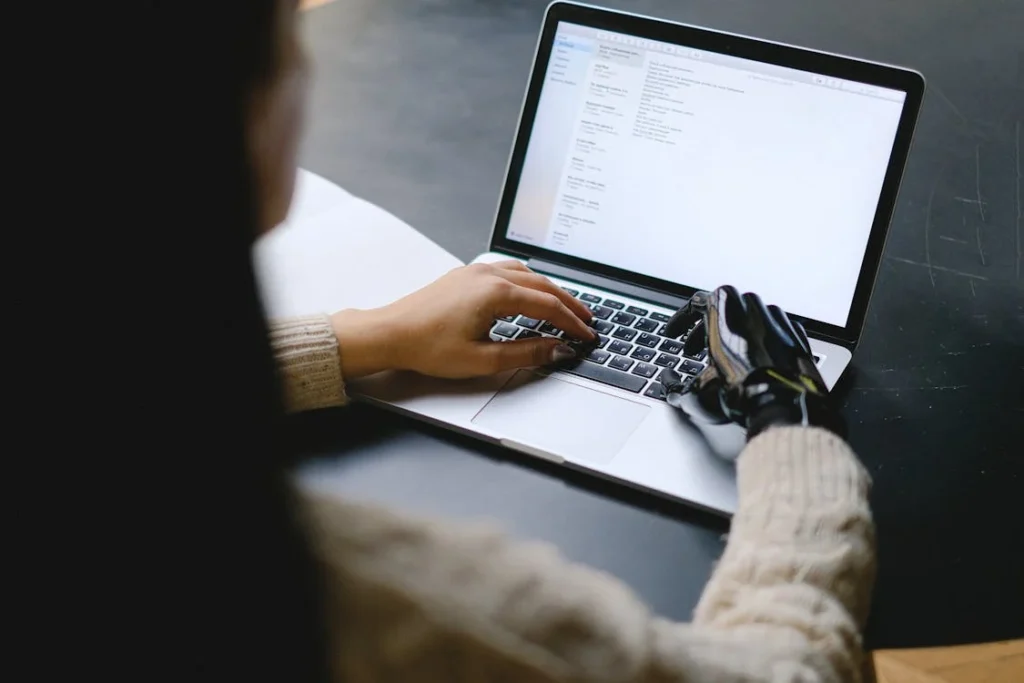
Common Challenges in Applying for Disability Pension and Prosthetic Benefits and How to Overcome Them
While the government has made efforts to provide financial aid and assistive devices to individuals with disabilities, many people face challenges when applying for these benefits.
Delays, bureaucratic hurdles, lack of awareness, and difficulty in gathering required documents can make the process frustrating. However, knowing how to navigate these issues can increase the chances of a successful application and ensure timely access to benefits.
Delays in Obtaining a Disability Certificate
One of the biggest challenges people face is the long waiting time to get a disability certificate. Many government hospitals have limited medical board sittings, meaning applicants must wait weeks or even months for an evaluation.
Additionally, incomplete paperwork or missing documents can result in repeated hospital visits, further delaying the process.
To avoid unnecessary delays, it is important to book an appointment in advance at the designated hospital or medical center.
Before visiting, applicants should ensure they have all necessary medical reports, identification proof, and recent prescriptions to speed up the evaluation.
If a hospital has a long waiting period, checking with other authorized hospitals or medical boards in neighboring districts may provide a faster alternative.
Lack of Awareness About the Application Process
Many people are unaware of the exact steps required to apply for disability pension and prosthetic benefits. This often leads to missed opportunities, as individuals may assume they do not qualify for assistance when, in reality, they do.
To overcome this, it is crucial to seek guidance from local disability welfare offices, NGOs, or rehabilitation centers that provide application assistance.
Several organizations, including ALIMCO and state disability welfare boards, conduct awareness programs and workshops to educate individuals on how to apply for these benefits.
The National Social Assistance Programme (NSAP) website (https://nsap.nic.in) also provides information on disability pension schemes, making it easier to understand eligibility criteria and application procedures.
Difficulties in Submitting the Application Online
While digital services have improved accessibility, many individuals—especially those in rural areas—struggle with online application submission. Poor internet access, lack of familiarity with online portals, and language barriers often make it difficult to complete the process.
Applicants facing these issues can visit Common Service Centres (CSCs), government disability welfare offices, or NGOs that offer assistance with online applications.
Many district offices have dedicated help desks where staff members guide individuals through the submission process. If applying for a prosthetic limb, seeking assistance from recognized prosthetic providers like Robobionics can also help navigate the process efficiently.
Rejection of Applications Due to Documentation Issues
Another common challenge is application rejection due to missing or incorrect documents. Many applicants submit incomplete forms, outdated medical certificates, or incorrect income proof, leading to rejection or delays.
To avoid this, applicants should double-check the required documents before submission. Visiting the local municipal office or social welfare department to verify the list of required documents can prevent errors.
Keeping multiple copies of all records, including Aadhaar, disability certificates, income proof, and bank account details, ensures a smoother verification process.
At Robobionics, we assist individuals in overcoming these challenges by providing guidance on documentation, connecting them with the right government agencies, and ensuring they receive timely prosthetic solutions.
Our team helps applicants understand the full process, making it easier to access financial and assistive benefits without unnecessary stress.
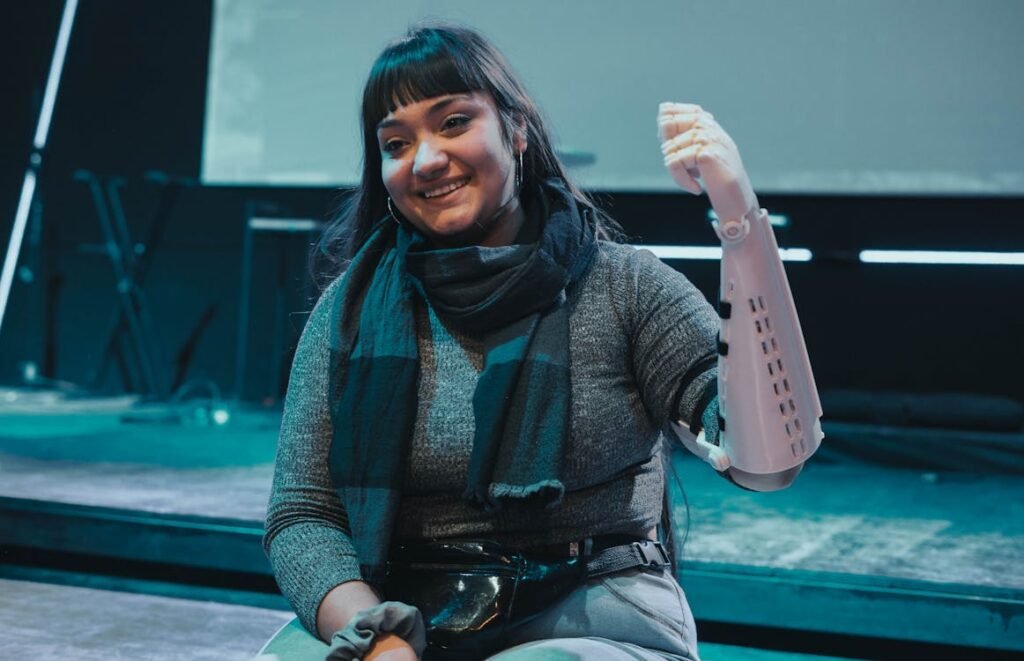
Additional Support Programs and NGOs That Help Individuals with Disabilities
Apart from government pension schemes and prosthetic benefits, several non-governmental organizations (NGOs), charitable foundations, and corporate social responsibility (CSR) initiatives work to support individuals with disabilities in India.
These organizations provide financial aid, free prosthetic limbs, rehabilitation services, skill development, and employment opportunities, helping people with disabilities lead more independent lives.
Bhagwan Mahaveer Viklang Sahayata Samiti (BMVSS) – Jaipur Foot
BMVSS is one of the largest organizations in the world providing free prosthetic limbs, calipers, and mobility aids to individuals in need.
Their flagship product, Jaipur Foot, is a low-cost yet highly functional prosthetic limb that allows users to walk comfortably on different terrains.
BMVSS conducts free prosthetic limb distribution camps across India, ensuring that even those in rural areas have access to mobility solutions. Individuals who need a basic yet effective prosthetic leg can approach BMVSS for assistance.
Artificial Limbs Manufacturing Corporation of India (ALIMCO)
ALIMCO is a government-owned enterprise that manufactures and distributes affordable prosthetic limbs, hearing aids, wheelchairs, and orthopedic devices for individuals with disabilities.
The organization collaborates with state governments, NGOs, and hospitals to supply prosthetics at low or no cost under various welfare schemes.
ALIMCO regularly holds prosthetic distribution camps, where eligible individuals can get fitted with a prosthetic limb free of charge.
The Narayan Seva Sansthan
Narayan Seva Sansthan is a non-profit organization that provides medical assistance, rehabilitation, and free prosthetic limbs to underprivileged individuals with disabilities.
Their hospitals and rehabilitation centers offer free corrective surgeries, physiotherapy, and mobility training, ensuring that recipients not only receive prosthetics but also learn how to use them effectively.
The organization also focuses on skill development and vocational training to help individuals become financially independent.
Rotary and Lions Clubs
International service organizations like Rotary International and Lions Clubs frequently organize healthcare camps, disability assistance programs, and prosthetic limb distribution drives.
These organizations partner with prosthetic manufacturers, hospitals, and rehabilitation centers to provide financial aid and free assistive devices to individuals in need.
People looking for local support in smaller cities and towns can contact their nearest Rotary or Lions Club chapter for information on upcoming initiatives.
Crowdfunding and Social Impact Initiatives
For those who do not qualify for government schemes or NGO assistance, crowdfunding can be an effective way to raise funds for prosthetic limbs and rehabilitation costs.
Online platforms like Ketto, Milaap, and ImpactGuru allow individuals to share their stories, connect with donors, and raise financial support for prosthetic treatments.
Many people who require high-end bionic limbs, microprocessor-controlled knees, or advanced rehabilitation therapies have successfully raised funds through these platforms.
At Robobionics, we collaborate with NGOs, disability organizations, and crowdfunding platforms to ensure that individuals who need high-quality prosthetic solutions receive the support they deserve.
We actively guide individuals in finding the best funding sources for their specific needs, making mobility solutions more accessible to all.
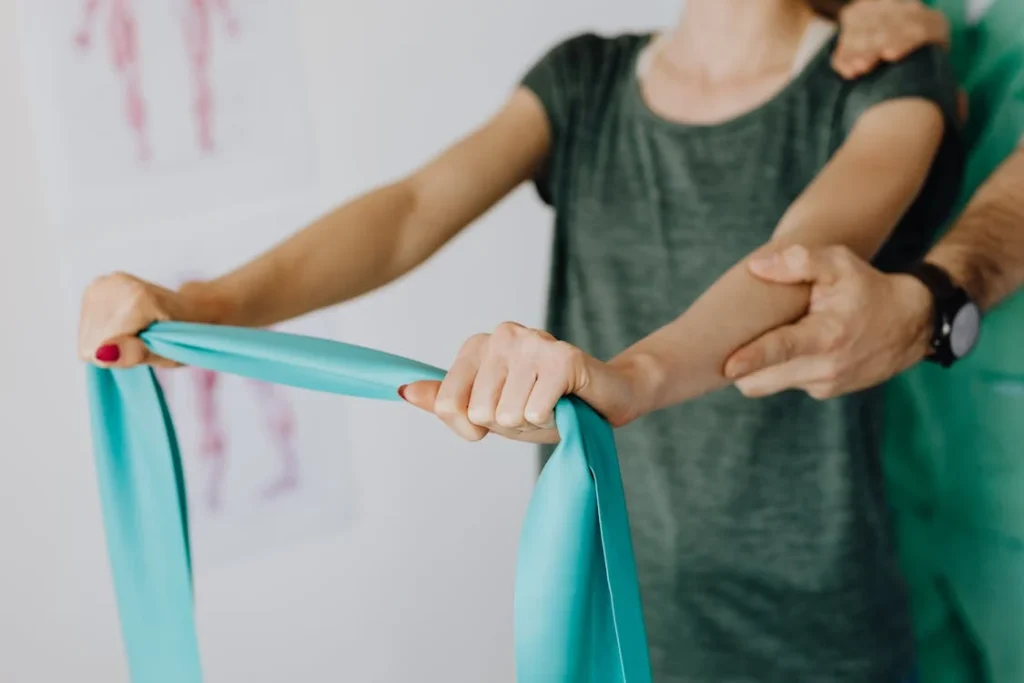
The Role of Rehabilitation in Maximizing Prosthetic Benefits
Receiving a prosthetic limb is only the first step toward regaining mobility and independence. The real challenge begins after fitting, as individuals must learn how to use their new limb effectively.
Rehabilitation plays a crucial role in this process, ensuring that prosthetic users gain strength, balance, coordination, and confidence in their movements. Without proper training, even the most advanced prosthetic limb may feel uncomfortable or difficult to use.
The Importance of Early Rehabilitation
For individuals who have recently undergone an amputation or limb loss, early rehabilitation is essential to prevent complications such as muscle atrophy, joint stiffness, and poor posture.
Many people assume they can immediately resume normal activities with a prosthetic, but adapting to an artificial limb requires guided training and continuous practice. The sooner rehabilitation begins, the smoother the transition to a prosthetic limb.
Government hospitals, private rehabilitation centers, and NGOs focused on disability welfare provide physical therapy sessions designed specifically for prosthetic users.
These sessions focus on gait training, muscle strengthening, and postural correction, ensuring that individuals learn how to walk, stand, and move without discomfort.
For upper limb prosthetic users, rehabilitation includes dexterity exercises, grip training, and functional movement practice to help them regain control of daily activities like eating, writing, and lifting objects.
Challenges in Accessing Rehabilitation Services
Despite the importance of rehabilitation, many prosthetic users in India face challenges in accessing proper training. Public hospitals often have limited physiotherapy resources, leading to long waiting times and insufficient personalized care.
In rural areas, specialized rehabilitation services are scarce, forcing individuals to travel long distances to urban centers for treatment.
Many people, especially those from low-income backgrounds, struggle to afford private rehabilitation sessions, leaving them without the necessary support to adapt to their prosthetic.
Another significant challenge is awareness. Many prosthetic users do not realize the importance of structured rehabilitation and attempt to use their new limb without professional guidance.
This can lead to incorrect posture, muscle strain, and difficulty performing movements, increasing the risk of injuries.
Lack of proper training also results in frustration and underuse of prosthetics, as some individuals give up on using their artificial limb due to discomfort or limited mobility.
The Future of Prosthetic Rehabilitation in India
To address these challenges, innovative rehabilitation methods such as home-based therapy programs, tele-rehabilitation, and gamified prosthetic training are gaining popularity.
Home-based rehabilitation allows individuals to practice movement exercises in a comfortable and familiar environment, reducing the need for frequent hospital visits.
Tele-rehabilitation connects patients with physiotherapists and prosthetic specialists via online consultations, ensuring that even those in remote areas receive expert guidance.
At Robobionics, we recognize that rehabilitation is just as important as the prosthetic limb itself. Our approach includes gamified home-based training programs, where users can practice movements in an engaging and interactive way.
This method helps individuals adapt faster to their prosthetic limb, improving confidence, mobility, and overall quality of life.

The Impact of Financial Barriers on Access to Prosthetic Benefits
For many individuals in India, the cost of a prosthetic limb is a major hurdle that prevents them from regaining mobility and independence.
While the government offers disability pensions and prosthetic benefits, financial barriers still exist at multiple levels—from the high upfront cost of advanced prosthetics to hidden expenses related to maintenance, rehabilitation, and travel for medical services.
Many people, especially those from low-income backgrounds, struggle to afford even the most basic prosthetic solutions.
The High Cost of Advanced Prosthetic Technology
The price of a prosthetic limb varies significantly based on the type of limb, materials used, and level of technology. A simple mechanical prosthetic, which provides only basic mobility, may be relatively affordable.
However, bionic limbs, myoelectric arms, and microprocessor-controlled knees can cost several lakhs, making them inaccessible to the average Indian household.
For individuals who require more functional and high-performance prosthetics—such as those who engage in physically demanding work or sports—choosing an advanced limb becomes essential.
However, limited financial assistance options for high-tech prosthetics force many people to settle for lower-quality solutions, which may not fully meet their mobility needs.
Even those who manage to secure a prosthetic through government schemes or NGO assistance may later struggle with ongoing maintenance costs, repairs, and eventual replacements.
Hidden Costs Beyond the Prosthetic Itself
The financial burden of prosthetic use goes beyond the one-time cost of purchasing the device. Many individuals underestimate the hidden expenses associated with prosthetic limb maintenance, including regular fittings, socket adjustments, and repairs.
Over time, the wear and tear of a prosthetic limb can lead to discomfort or reduced functionality, requiring professional servicing or part replacements.
For children and young adults, frequent prosthetic upgrades are necessary as their bodies grow and change.
A prosthetic limb that fits perfectly today may become uncomfortable or restrictive within a year, leading to the need for multiple refittings or new prosthetics over time.
Many families do not financially plan for these future expenses, leading to gaps in prosthetic use when they cannot afford replacements.
Travel expenses add another layer of financial strain. Many prosthetic users live in rural areas where access to specialized prosthetic services and rehabilitation centers is limited.
This means they must frequently travel to urban centers for fittings, repairs, and follow-up medical consultations, adding transportation and accommodation costs to their overall expenses.
The Role of Financial Assistance and Alternative Funding Solutions
Addressing these financial challenges requires a multi-faceted approach, combining government funding, private financing options, NGO support, and alternative fundraising strategies.
While government programs cover basic prosthetic limbs, more comprehensive financial assistance is needed to make advanced prosthetics accessible to a wider population.
Some organizations have started offering installment payment plans and zero-cost EMI options to help users afford high-quality prosthetics.
Crowdfunding has also emerged as a popular way to raise funds for expensive medical treatments, allowing individuals to reach out to friends, family, and the broader community for financial support.
At Robobionics, we work closely with financial institutions, NGOs, and government programs to ensure that individuals receive the best prosthetic solutions without financial stress.
We help prosthetic users explore loan and EMI options, apply for subsidies, and connect with funding programs, making high-quality mobility solutions more affordable and accessible.
Conclusion
Applying for disability pension and prosthetic benefits in India can be a complex process, but with the right guidance, financial support, and rehabilitation, individuals can regain mobility and independence. While government schemes, NGOs, and financial aid programs exist, awareness and accessibility remain major challenges. Many eligible individuals miss out on benefits due to lack of information, bureaucratic delays, or financial barriers, making it essential to navigate the system strategically.
Beyond the cost of a prosthetic, users must plan for rehabilitation, maintenance, and long-term expenses to ensure a comfortable and functional experience. With growing awareness and innovative financing solutions such as EMI plans, crowdfunding, and NGO support, access to high-quality prosthetic limbs is becoming more achievable.
At Robobionics, we are committed to helping individuals find the right prosthetic solutions while guiding them through the funding and application process. Whether through government benefits, private financing, or alternative funding, we believe that cost should never be a barrier to mobility.



